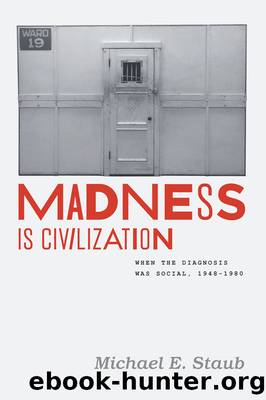Madness Is Civilization by Michael E. Staub

Author:Michael E. Staub
Language: eng
Format: epub
Publisher: University of Chicago Press
Published: 2011-07-28T16:00:00+00:00
6
Person Envy
The invisible woman in the asylum corridor
sees others quite clearly,
including the doctor who patiently tells her
she isn’t invisible—
and pities the doctor, who must be mad
to stand there in the asylum corridor
talking and gesturing to nothing at all. Robin Morgan, Monster (1972)1
I
An influential and absolutely indispensable aspect of both antipsychiatric thought and radical therapy during the late 1960s and 1970s was the feminist insurgency. Feminism challenged the outrageous power of psychiatrists to ensure obedience to mystiques of femininity in their female patients. Psychologist Naomi Weisstein may be credited with breaking the door down with her oft-reprinted “Kinder, Küche, Kirche as Scientific Law: Psychology Constructs the Female” (1968), in which she argued how women were routinely characterized psychologically as “inconsistent, emotionally unstable, lacking in a strong conscience or super-ego, weaker, ‘nurturant’ rather than productive, ‘intuitive’ rather than intelligent, and, if they are at all ‘normal,’ suited to the home and the family.”2 But legions of angry women, on and off the couch, were to follow—rejecting the assumptions about women’s minds and exposing the vapid dogmatism, retrograde notions of gender roles, and insidious emotional manipulation (not to mention undertheorized countertransference and lechery) at work in too many doctor-patient encounters. In these and other respects, feminists assailed the disciplines of psychology and psychiatry and maintained that society made persons—and especially women—sick. “Cultures that practiced female infanticide were at least honest in how they felt about women,” wrote sociologist Pauline Bart angrily in 1971. “Better we should have been exposed on a mountain side as infants, than to have the death of a thousand cuts which is the fate of women, particularly intelligent women, in our society.”3 Such sentiments were far from unusual at this moment.
Yet there developed also in the early 1970s a second immensely more influential and divergent strand of antipsychiatric thinking—one whose complex overlaps with feminist therapy on the one hand, and whose eventual damage to the reputation of antipsychiatry on the other, have not been adequately accounted for. Popular psychological self-help guidebooks promising greater joy and self-fulfillment were antipsychiatry for the masses. Self-help flourished in the early 1970s. Almost one in every six best-selling books fit into this category—a much higher percentage of titles than ever before. Hundreds of millions of self-help books sold during the decade.4 These best-selling titles routinely rejected the psychiatric status quo. Theirs was an alternative approach to therapy that did not require countless dollars spent on endless hours in analysis—money and time, the books argued, that was most likely going to be wasted in any event. What new pop psych books offered, as psychiatrist Thomas A. Harris wrote on the opening page of I’m OK—You’re OK (1969)—one of the earlier and most popular self-help manifestos of the era—was “a new answer to people who want to change rather than to adjust, to people who want transformation rather than conformation.”5 Pop psych was “radical therapy” turned populist, and without the “radical.” Pop psych emphasized taking control and individual responsibility. “No more probing into your forgotten past,”
Download
This site does not store any files on its server. We only index and link to content provided by other sites. Please contact the content providers to delete copyright contents if any and email us, we'll remove relevant links or contents immediately.
| Administration & Medicine Economics | Allied Health Professions |
| Basic Sciences | Dentistry |
| History | Medical Informatics |
| Medicine | Nursing |
| Pharmacology | Psychology |
| Research | Veterinary Medicine |
Bioenergetica by Alexander Lowen(1475)
The Child in You by Stefanie Stahl(1266)
No Bad Parts by Richard C. Schwartz(1254)
Noise: A Flaw in Human Judgment by Sunstein Cass R. & Sibony Olivier & Kahneman Daniel(1192)
The Data Detective by Tim Harford(1136)
Chatter by Ethan Kross(1071)
The Science of Rapid Skill Acquisition by Peter Hollins(923)
The Quantum Psychiatrist: From Zero to Zen Using Evidence-Based Solutions Beyond Medication and Therapy by Biswas Dona(881)
Freedom by Sebastian Junger(859)
The Montessori Baby by Simone Davies(858)
Maps of Meaning: The Architecture of Belief by Jordan B. Peterson(752)
The Science of Self-Learning: How to Teach Yourself Anything, Learn More in Less Time, and Direct Your Own Education (Learning how to Learn Book 1) by Peter Hollins(747)
Evolution Gone Wrong: The Curious Reasons Why Our Bodies Work by Alex Bezzerides(708)
Sadomasochism and the BDSM Community in the United States by Stephen K. Stein(696)
Anxiety For Dummies by Charles H. Elliott & Laura L. Smith(670)
Disconnected by thomas Kersting(664)
Why Sex Doesn't Matter by Olivia Fane(664)
The Mechanics of Passions: Brain, Behaviour, and Society by Alain Ehrenberg(634)
Jung - The Key Ideas: Teach Yourself (TY Philosophy) by Ruth Snowden(629)
